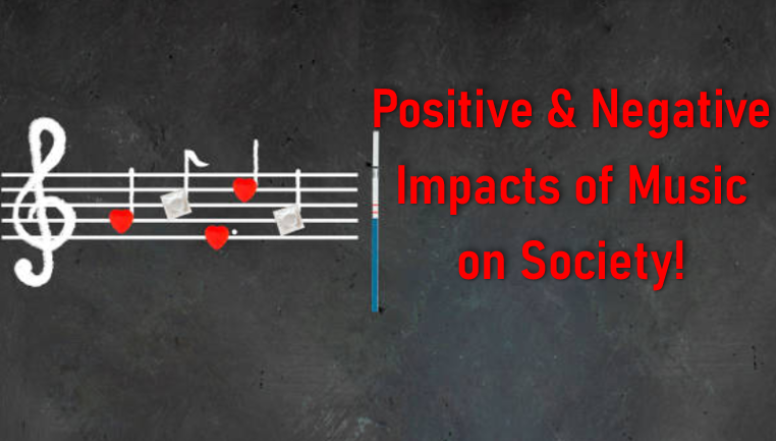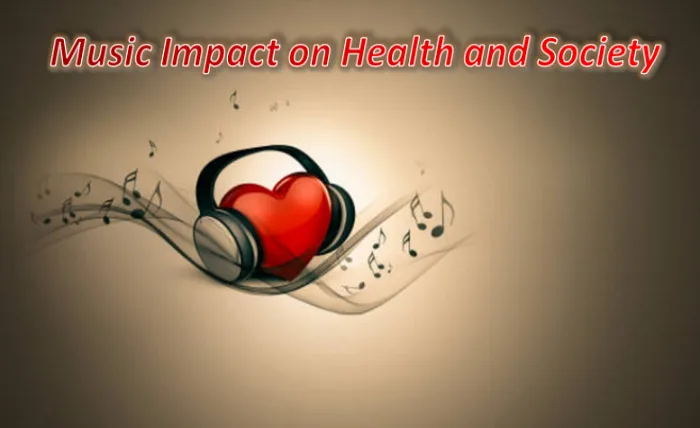Where words fail, music comes to the rescue. Music has been an integral part of human civilization. From generation-to-generation stories are transferred through music and songs. Music brings people together, uplifts them and gives them hope and courage.
So, are you interested in knowing music’s impact on health and society? Stick around because in this article we will take a look at how music influences our lives and its impact on health and society in detail. So, let’s dive in;
How Does Music Affect Our Bodies and Minds?
- Mood Booster: Ever felt down and played ABBA’s Dancing Queen, if this reference is too old for you then maybe Roar by Katty Perry lifted your spirits. Music can boost our mood and be a companion to us in hard times. Music stimulates the release of dopamine, the “feel-good” neurotransmitter, making us happier.
- Emotional Influence: For developing and enhancing emotional intelligence music is vital. Music helps in generating empathy for the oppressed and misunderstood. It helps people in channeling hard feelings.
- Physical Health: Studies suggest Physical health can be improved through music. Music leads to longer workouts, improved sleep, better heartbeat and an improved immune system.
- Memory and Learning: Music is a great tool for learning and improving memory. Lessons taught in the form of short poems with musical rhythm stay with children and are easy to memorize. I still remember our science teacher made us learn about force in 6th grade through a song titled “A push or a pull”.
What Are the Positive and Negative Impacts of Music on Society?

Positive Impacts of Music on Health
-
Reduces Stress and Anxiety
It is proven that music has a calming effect on people, it can help people in reducing stress and anxiety. Calming music and slow-tempo jams can help in activating relaxation responses. Music can provide a healthy distraction from stress. Bi-neural beats and meditation music can help to relax and reduce anxiety.
-
Improves Mood and Emotional Well-being
Music is a great way to improve your mood and emotional well-being. When you are feeling heartbreak, a Taylor Swift song can be therapeutic; it can improve your mood and boost your confidence. Music helps in elevating mood, expressing emotions and boosting your motivation and productivity.
-
Reduces Pain and Discomfort
Pain and discomfort can be reduced by using musical therapy. Music can help people distract from their pain post-major surgery. If you are living in a city that never sleeps music can help you gain improved sleep.
-
Boosts the Immune System
Studies have shown that music has a positive impact on a person’s immune system. It can help give the patients hope and increase their willpower to fight diseases. An improved immune system helps in the body’s ability to combat the illness.
-
Improves Cognitive Function
Music can help improve cognitive functions. Learning a musical instrument can help in promoting Neuroplasticity; enabling the brain to grow and adapt, improve motor skills, increase creativity and problem-solving skills, pattern recognition and increase focus and attention.
Positive Impacts of Music on Society
-
Brings People Together
Music helps in forming social connections. People enjoying similar music or a specific artist can come together to form communities. With the help of social media platforms people from around the globe can come together to form fandoms. To reach a wider audience artists can buy active followers and likes on the music they share on social media platforms.
-
Promotes Cultural Understanding
Music is unique to where it comes from. It is an accessible art form that can be used to showcase and promote cultural understanding.
-
Educates and Inspires
Entertaining music can also educate and inspire. Artists can use music to voice their support for the oppressed and ask their fans to help those in need. Taylor Swift, released “You Need to Calm Down” and openly supported gay people in 2019 and asked people to sign a petition in support of the Equality Act which has 850,281 signatures.
-
Provides a Platform for Self-expression
Music is a great art form for self-expression. It can help express emotions. Artists can use music to share their thoughts, beliefs and ideas entertainingly and engagingly.
-
Can Be Used for Social Change
Music can be used by artists to help raise awareness and bring social change. Songs like Pretty Hurts by Beyonce and Victorias Secret by Jax help a lot of girls struggling with body image. To promote their songs with a social message artists can buy likes and active followers to generate discourse.
Negative Impacts of Music on Health
-
Too Loud Music Can Damage Hearing
Listening to loud music for an extended period can adversely affect human hearing. Human ears are sensitive and exposure to loud music at concerts, stadiums or through headphones will negatively affect hearing ability.
-
Certain Types of Music Can Promote Negative Emotions
Not all music promotes positivity and hope, as we know music is highly effective in playing with the emotions of people. Music promoting self-harm, body shaming, sexism and drugs has a bad influence on youth. Often negative emotions like self-harm, hatred and nihilism are promoted.
-
Music Can Be Addictive
Addiction to anything is bad. Music can often become addictive and hard to get out of your head due to its catchy and rhythmic nature leading to loss of focus and attention in work.
-
Music Can Be Used to Manipulate People
Music is the most effective tool to spread your message to the masses. Often political parties will use music to string at people’s hearts and manipulate them into voting for them.
Negative Impacts of Music on Society
-
Music Can Be Used to Spread Hate and Violence
Where music brings people together it is also seen that it can be used to spread hate and violence. We have seen quite recently the rise of country songs like “Try That in a Small Town” that promote hate and racism.
-
Music Can Be Used to Exploit People
In Today’s digital age music is often used to exploit people for financial gains. It may be hard to believe that music is utilized to exploit but think again didn’t you buy those candles after watching Instagram reels set to a Lana Del Rey song?
-
Music Can Be Used to Promote Harmful Stereotypes
Music can be used to raise awareness and voice for social change on the other hand it can also be utilized to promote harmful stereotypes like Homophobia, Racism and Sexism. With immense polarization songs like “Try That in a Small Town” and “Rich Men North of Richmond” promoting racism are applauded by right-wing politicians and celebrities.
FAQ’s
Q: Why is music beneficial to society?
A: Music brings us together and helps us understand our differences in a peaceful way.
Q: What is the influence of music on health and life?
A: Music helps in reducing stress and anxiety, improves cognitive functions and boosts the immune system.
Q: How does music influence us?
A: Music influences us by increasing blood flow to brain areas which control emotional response. Listening to a feel-good song releases dopamine, the “feel-good” neurotransmitter, making us happier.
Q: How much music is healthy?
A: A study by the British Academy of Sound Therapy (BAST) suggests that 78 minutes of music per day is considered healthy.
Conclusion
In conclusion, music is an important part of human life. It helps in creating community and understanding our differences. It inspires and educates us to raise our voice for social change. It helps in reducing stress and anxiety, improves cognitive functions and boosts the immune system. Music can also become addictive, promote negative emotions and manipulate people. Loud music can have adverse effects on hearing. It can also be used to promote harmful stereotypes and hate. Good luck and thanks for reading!



